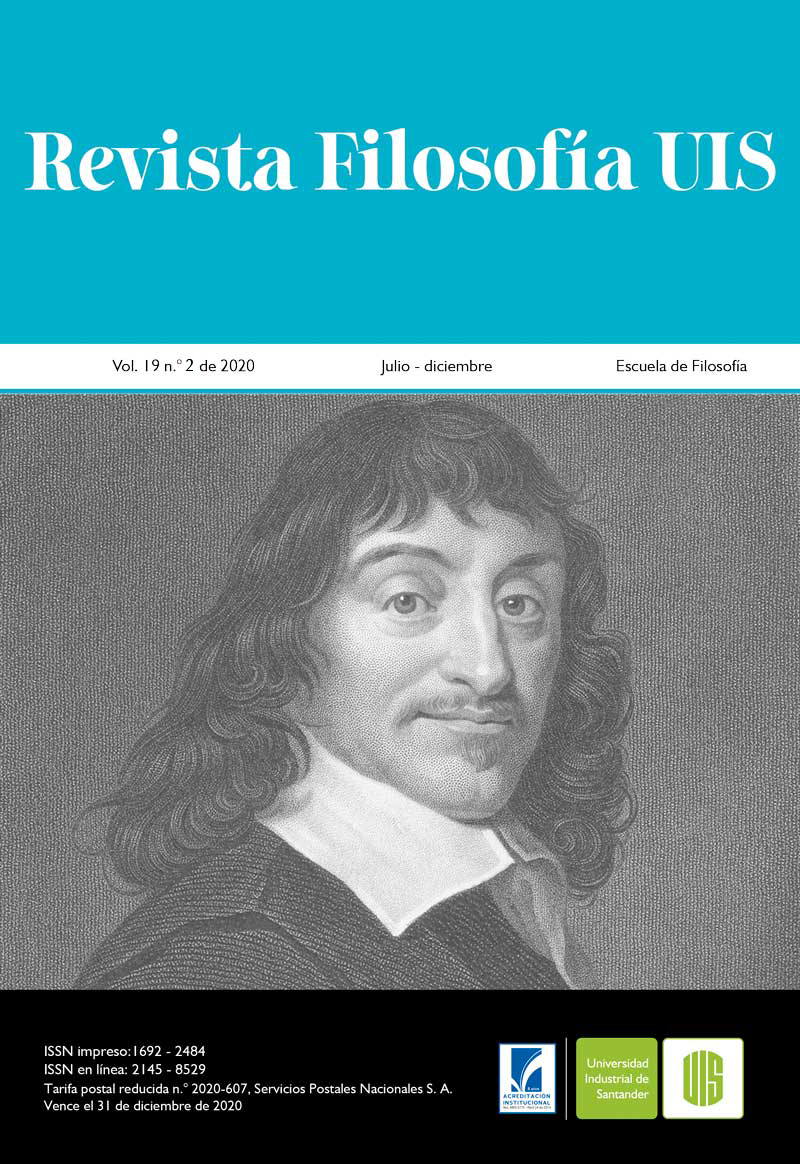Conceptual issues on Kant’s theory of inner experience
Publicado 2020-05-29
Palavras-chave
- inner sense,
- apperception,
- self-consciousness,
- self,
- anthropology
Como Citar
Copyright (c) 2020 Revista Filosofía UIS

Este trabalho está licenciado sob uma licença Creative Commons Attribution 4.0 International License.
Resumo
This paper discusses the use of certain terms associated to I. Kant’s account of inner experience. Inner experience is a subject matter relevant in Kant’s thought, which encompasses metaphysical and anthropological issues worthy of consideration. By examining the Critique of Pure Reason and the Anthropology from a pragmatic point of view, one can see the confused use of the terms: inner sense, empirical, pure, and transcendental apperception, discursive and intuitive self-consciousness, consciousness of oneself divided into reflection and apprehension, intellectual and empirical consciousness of one’s existence. Therefore, I focus on the philosophical meaning of the previous terms and their relation to the problem of inner experience, which depends upon the outer experience. Finally, I deal with the problem of the content of inner sense, suggesting that its content does not correspond to a single, simple thing, but rather to a flux of inner representations.
Downloads
Referências
Aquila, R. E. (1983). Representational Mind: A Study of Kant’s Theory of Knowledge. Indiana University Press.
Brook, A. (1994). Kant and the mind. Cambridge University Press.
Carl, W. (1992). Die Transzendentale Deduktion der Kategorien in der ersten Auflage der Kritik der reinen Vernunft. Vittorio Klosterman.
Carruthers, P. (2011). The Opacity of Mind: An Integrative Theory of Self-Knowledge. Oxford University Press.
Cohen, A. A. (2009). Kant and the Human Sciences: Biology, Anthropology and History. Palgrave Macmillan.
Collins, A. W. (1999). Possible Experience: Understanding Kant's Critique of Pure Reason. University of California Press.
Dessoir, M. (1924). Kant und die Psychologie. Kant-Studien, 29, 98-120.
Dyck, C. W. (2016). The Scope of Inner Sense: The Development of Kant’s Psychology in The Silent Decade. Con-Textos Kantianos: International Journal of Philosophy, (3), 326-344.
Foucault, M. (2008). Introduction to Kant’s Anthropology. (R. Nigro & K. Briggs, trans.). Semiotext.
Howell, R. (2001). Kant, the ‘I Think’, and Self-Awareness. In P. Cicovacki (Ed.), Kant's Legacy: Essays in Honor of Lewis White Beck (pp.117-152). University Rochester Press.
Hume, D. (1739/21978). A Treatise of Human Nature. Selby-Bigge & P. H. Nidditch (Eds.). Oxford University Press.
Kant, I. (1900ff.). Kant‘s gesammelte Schriften, Akademie Ausgabe. In Königlich Preussischen Akademie der Wissenschaften (Ed.). G. Reimer [later W. de Gruyter].
Kant, I. ([1781/1787] 1998). Critique of pure reason. In P. Guyer., & A. W. Wood (Eds.). Cambridge University Press.
Kemp Smith. N. (2003). A commentary to Kant’s “Critique of Pure Reason” (3rd ed.). Palgrave Macmillan.
Kirchmann, J. H. (1869). Erläuterungen zu Kant's Anthropologie in pragmatischer Hinsicht. Verlag von L. Heimann.
Kitcher, P. (2016). What Can Humans Cognize about the Self from Experience? Comments on Corey Dyck’s “The Development of Kant’s Psychology during the 1770’s”. Con-Textos Kantianos: International Journal of Philosophy, 1(3), 345-352.
Longuenesse, B. (2006). Self-consciousness and consciousness of one’s own body: Variations on a Kantian theme. Philosophical Topics, 34(8), 1–2, 283-309.
Lycan W. (1996). Consciousnes and experience. MIT Press.
Makkreel, R. (2014). Self-Cognition and Self-Assessment in Kant’s Lectures on Anthropology. In A. Cohen (Ed.) Kant’s Lectures on Anthropology (pp. 18-37). Cambridge University Press.
Marshall, C. (2010). Kant’s Metaphysics of the Self. Philosophers’ Imprint, 10(8), 1-21.
Melnick, A. (2009). Kant’s theory of the self. Routledge.
Mohr, G. (1991). Das sinnliche Ich: Innerer Sinn und Bewußtsein bei Kant (Vol. 81). Königshausen & Neumann.
Monzel, A. (1920). Kants Lehre vom inneren Sinn und der Zeitbegriff im Duisburg'schen Nachlaß. Kant-Studien, 25 (1), 427-435.
Pacheco Acosta, H. (2018). Theoretical assumptions in Kant’s theory of time. Sincronía, (74), 29-58.
Pappe, H. O. (1961). On Philosophical Anthropology. Australasian Journal of Philosophy, 39 (1), 47-64.
Paton, H. J. (1936). Kant's Metaphysic of Experience: A Commentary on the first half of the Kritik der reinen Vernunft (Vol 1). Allen & Unwin.
Picciuto, V. & Carruthers, P. (2014). Inner sense. In D. Stokes, M. Matthen, S. Biggs (Eds.), Perception and Its Modalities (pp. 277-296). Oxford University Press.
Prauss, G. (1971). Erscheinung bey Kant: ein Problem der “Kritik der reinen Venunft”. De Gruyter.
Roche, M. (2013). A Difficulty for Testing the Inner Sense Theory of Introspection. Philosophy of Science, 80(5), 1019-1030.
Rockmore, T. (2012). Kant on Unconscious Mental Activity. In P. Giordanetti, R. Pozzo & M. Sgarbi (Eds.) Kant’s Philosophy of the Unconscious (pp. 305-326). De Gruyter.
Rukgaber, M. S. (2009). The Key to Transcendental Philosophy: Space, Time and the Body. Kant-Studien, 100(2), 166-186.
Schmitz, F. (2013). On Kant’s Conception of Inner Sense: Self-Affection by the Understanding. European Journal of Philosophy, 23(4), 1044-1063.
Shoemaker, S. (1994). Self-Knowledge and "Inner Sense" Lecture I: The Object Perception Model. Philosophy and Phenomenological Research, 54(2).
Schulting, D. (2015). Transcendental Apperception and Consciousness in Kant’s Lectures on Metaphysics. In R. R. Clewis (Ed.), Reading Kant’s Lectures (pp. 89-114). De Gruyter.
Strawson, P. (1966). The Bounds of Sense: An Essay on Kant’s Critique of Pure Reason. Methuen & Co. Ltd.
Strawson, P. (1997). Entity and Identity: And Other Essays. Oxford University Press.
Sturm, T. (2017). Reines und empirisches Selbstbewusstsein in Kants Anthropologie: Das “Ich” und die rationale Charakterentwicklung. In G. Motta & U. Thiel (Ed.), Immanuel Kant: Die Einheit des Bewusstseins (pp. 195-220). De Gruyter.
Thiel, U. (1997). Varieties of inner sense. Two pre-Kantian theories. Archiv für Geschichte der Philosophie, 79(1), 58-79.
Valaris, M. (2008). Inner sense, self-affection, and temporal consciousness in Kant's critique of pure reason. Philosophers’ Imprint, 8(4), 1-18.
Vogel, J. (1993). The Problem of Self-Knowledge in Kant's "Refutation of Idealism": Two Recent Views. Philosophy and Phenomenological Research, 53 (4), 875-887.
Wolff, R. P. (1963). Kant's Theory of Mental Activity. Harvard University Press.
Yalcin, S. (2002). The Problem of Inner Sense in Kant's First Critique. Journal of Academic Studies, 4(15), 181-190.

